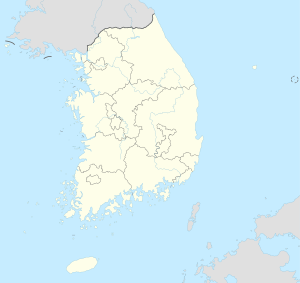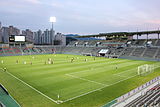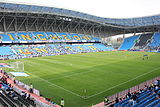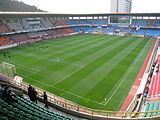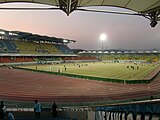K League 1: Difference between revisions
No edit summary |
|||
| Line 302: | Line 302: | ||
! [[Suwon Samsung Bluewings|Suwon Samsung<BR/>Bluewings]] |
! [[Suwon Samsung Bluewings|Suwon Samsung<BR/>Bluewings]] |
||
! [[Ulsan Hyundai FC|Ulsan Hyundai]] |
! [[Ulsan Hyundai FC|Ulsan Hyundai]] |
||
! |
|||
|- |
|- |
||
| [[Tancheon Sports Complex]] |
| [[Tancheon Sports Complex]] |
||
| Line 308: | Line 307: | ||
| [[Suwon World Cup Stadium]] |
| [[Suwon World Cup Stadium]] |
||
| [[Ulsan Munsu Football Stadium]] |
| [[Ulsan Munsu Football Stadium]] |
||
| |
|||
|- |
|- |
||
| Capacity: '''16,250 ''' |
| Capacity: '''16,250 ''' |
||
| Line 314: | Line 312: | ||
| Capacity: '''43,959 ''' |
| Capacity: '''43,959 ''' |
||
| Capacity: '''44,474''' |
| Capacity: '''44,474''' |
||
| |
|||
|- |
|- |
||
| [[File:Tanchon20100223 1.JPG|160px]] |
| [[File:Tanchon20100223 1.JPG|160px]] |
||
| Line 320: | Line 317: | ||
| [[File:Suwon World Cup Stadium 20120520 4.JPG|160px]] |
| [[File:Suwon World Cup Stadium 20120520 4.JPG|160px]] |
||
| [[File:Ulsan 20030717 1.JPG|160px]] |
| [[File:Ulsan 20030717 1.JPG|160px]] |
||
| |
|||
|} |
|} |
||
</center> |
</center> |
||
Revision as of 14:24, 5 January 2013
| File:K League Classic.png | |
| Founded | 1983 |
|---|---|
| Country | |
| Confederation | AFC |
| Number of teams | 14 |
| Level on pyramid | 1 |
| Relegation to | K League |
| Domestic cup(s) | FA Cup |
| International cup(s) | AFC Champions League |
| Current champions | FC Seoul (2012) |
| Most championships | Seongnam Ilhwa Chunma (7) |
| TV partners | KBS, SBS, TV Chosun |
| Website | Official Website |
| Current: 2013 K League Classic | |
| K League 1 | |
| Hangul | K리그 클래식 |
|---|---|
| Revised Romanization | K rigeu keullesik |
| McCune–Reischauer | K rigŭ |
The K League Classic is one of South Korea's professional association football league. At the top of the South Korean football league system, it is the country's highest and most prestigious level of football competition currently contested by 14 clubs.
Establishment
The K-League Classic was founded in 1983 as the Korean Super League, with five member clubs. The initial five clubs were Hallelujah FC, Yukong Kokkiri, POSCO Dolphins, Daewoo Royals, Kookmin Bank FC. Hallelujah FC won the inaugural title, finishing one point ahead of Daewoo FC to lift the crown.
In 1998, Korea's football league was reformed and renamed the K-League. Since its creation, the league has expanded from an initial 5 to 16 clubs. Of the 5 inaugural clubs, only Yukong Kokkiri, POSCO Dolphins, and Daewoo Royals remain in the K-League; Kookmin Bank FC dropped out of the league at the end of 1984, and Hallelujah FC followed the season after.
Structure
At present the K-League is the only professional league in Korea. It contains sixteen member clubs.
Below the level of the K-League there is the National League, a closed semi-professional/amateur league with fifteen clubs, established in 2003. The third level of football in Korea is the Challengers League.
There is, at present, no official system of promotion and relegation between any of the three leagues. However, beginning in 2006, the champions of the National League had been eligible for promotion to the K-League provided they had met certain criteria. Goyang Kookmin Bank and Ulsan Mipo Dockyard, National League champions in 2006 and 2007 respectively, both rejected the opportunity to move up to the K-League. After back-to-back K-League promotion refusals, the National League committee decided to discontinue the conditional promotion system prior to the 2008 season.
League summary
The K-League season typically begins around March/April and runs to late November each year. The number of games, clubs and the systems used have varied through the years, but for 2009 the league will operate with a full stage regular season followed by a top six championship playoff system.
The sixteen member clubs play each other twice in the regular season giving a total of 30 matches. The top six sides at the end of the regular season will enter the championship playoffs, which decide final standings of the season among the six. In the first two matches, the third-placed team will face the sixth-placed team and the fourth-placed team will face the fifth-placed team, with the two winners then playing off for the right to face the second-placed team. The winner of that match will then progress to the two-legged championship playoff final where the first-placed side lie in wait, with the overall winner of the home and away series being crowned champions for 2009.
The K-League champions, runner-up and third place gain entry to the AFC Champions League the following season, with the exception of Sangmu, due to their unique status as an army team, and therefore non-professional.
A number of the member clubs are owned by major Korean Chaebols, and the club names reflect that fact. Clubs have adopted local city names in an effort to integrate themselves more with the local communities; for example, Daewoo evolved over the years into Daewoo Royals, Pusan Daewoo Royals, Busan I'ons and latterly Busan IPark.
In 1996, K-League franchise structure was changed hugely. Originally, When the franchise system was introduced in 1987, K-League club's franchise were big cities of South Korea like Seoul, Busan, Daegu, Incheon, Gwangju, Daejeon. But Theses cities are also franchise of Korean Baseball teams. Some K-League clubs gave up big city franchise and relocated to mid sized-small city franchise like Ulsan, Pohang by 1990. and In 1996, Due to Decentralization policy in K-League, K-League clubs in Seoul were moved to Seoul's satellite small city Anyang, Bucheon, Cheonan. Also Samsung was joined in 1996, But Samsung was chosed Suwon, mid sized-small city franchise. As a result, In 1996 K-League franchise structure changed to mid sized-small city franchise totly.
Following the 2002 FIFA World Cup, leaders of the K-League had hoped to transfer South Korea’s passion for its National Team to the domestic league. However, the K-League continued to flounder.[1] Although a number of K-League clubs have relocated in the past, the Lucky Goldstar (LG) corporation caused a huge controversy[not specific enough to verify] at the end of 2003 when they made the decision to uproot their Anyang LG Cheetahs from the Seoul satellite city of Anyang and move into the empty Seoul World Cup Stadium, becoming FC Seoul. Then following the 2005 season SK announced it was moving the Bucheon SK FC to the island of Jeju, where they became Jeju United.
In the 2009 season, Gangwon FC (Head Coach: Choi Soon-Ho, former Ulsan Hyundai Mipo Dolphin head coach) joined the K-League as its 15th member club. As such, the K-League had one or more club in every Korean Province (Gyeonggi, Gyeongsang, Jeolla, Chungcheong, Gangwon, and Jeju). This is the first time in domestic Korean professional sports history that there has been at least two clubs in each Korean province.
On April 5, 2010, Gwangju City has announced a plan to establish a football club by end of 2010 & to join the league from the 2011 season. On October 12, 2010, the club was approved to join the league as 16th member club.
On October 5, 2011, the league announced a plan to introduce a relegation system from 2012 season. A number of teams of the league will decreased to 12 teams from 2013 season. 4 teams will be relegated to next level league based on the standing of 2012 season. And, the league introduced a split system like Scottish Premier League from the 2012 season.
The league introduced the relegation system from the 2012 season. According to new relegation rule, 2 teams each will be relegated to lower level league based on the standing of 2012 and 2013 season, respectively (total: 4 teams). The league also changed the amount of entrance fee from 1 billion to 500 million Korean won.
2013 season
Participating Clubs (2013)
|
As of 2013 Season, K League Classic Clubs by Province
|
|
|
The following 14 clubs will compete in the K League Classic during the 2013 season.
- K League Classic's principle of official statistics is that final club succeeds to predecessor club's history & records.
- K League Official Club Profiles Page
Stadiums (2013)
Primary venues used in the K League Classic:
Records and statistics
K-League Champions
Seongnam Ilhwa Chunma are the most successful team in terms of championship victories, having lifted the title on no less than seven occasions.
The roll-call of champions is as follows (present-date names included where teams have changed names previously):
- K-League's principle of official statistics is that final club succeeds to predecessor club's history & records.
Titles By Season
Titles By Club
| Club | Champions | Runners-Up | Winning Seasons | Runners-Up Seasons |
|---|---|---|---|---|
| Seongnam Ilhwa Chunma | 1993, 1994, 1995, 2001, 2002, 2003, 2006 | 1992, 2007, 2009 | ||
| FC Seoul | 1985, 1990, 2000, 2010, 2012 | 1986, 1989, 1993, 2001, 2008 | ||
| Pohang Steelers | 1986, 1988, 1992, 2007 | 1985, 1987, 1995, 2004 | ||
| Busan IPark | 1984, 1987, 1991, 1997 | 1983, 1990, 1999 | ||
| Suwon Samsung Bluewings | 1998, 1999, 2004, 2008 | 1996, 2006 | ||
| Ulsan Hyundai | 1996, 2005 | 1988, 1991, 1998, 2002, 2003, 2011 | ||
| Jeonbuk Hyundai Motors | 2009, 2011 | 2012 | ||
| Jeju United | 1989 | 1984, 1994, 2000, 2010 | ||
| Hallelujah FC | 1983 | |||
| Chunnam Dragons | 1997 | |||
| Incheon United | 2005 |
Titles By City / Area
Titles By Province
Title Sponsors
All-time K-League ClubsThere have been a total of 19 member clubs in the history of the K-League - those clubs are listed below with their current names (where applicable):
[1] Yokong renamed to SK Energy Franchise relocations in K-League
[1] K-League officially began city franchise policy in 1990, But Pohang Stleeers began in 1988 and Busan I'Park began in 1989. K-League Awards
Players
Foreign Players
At the inception of the K-League in 1983, only two Brazilian players made rosters. At the time, rules allowed each club to have three foreign players and that the three could also play simultaneously in a game. From the 1996 season, each team had five foreign players among whom three could play in a game at the same time. Moreover, from the 2000 season to the 2002 season, the limit on foreign players was expanded seven but only three could play in a game at the same time. The limit was lower to five in 2003, four in 2005, and three in 2007. From the 2009 season, the number of foreign players went back up to four per team, including a slot for a player from AFC countries. In the 1985 season, Piyapong Pue-on of Thailand led foreign players in the league in scoring and assists. Other leading players were Rade Bogdanović, who had 10 goals and 10 assists in the 1996 season. Valeri Sarychev, the K-League's most famous foreign goalkeeper, played in 320 league games from 1992 to 2004. He was eventually naturalized as a Korean citizen and given the Korean name Shin Eui-Son which means God's hand because of his stellar play. In the 1990s, the trend was for the K-League to get foreign players from Eastern Europe like Rade Bogdanović, Radivoje Manic, Saša Drakulić and Denis Laktionov. From 2000, Brazilians became the K-League's priority such as Tavares, Mota, Nádson, Adilson and Edu. Since 2009, players from AFC have been fairly popular especially those from Australia, China PR, Japan and Uzbekistan.
Crest
See also
References
External links
|
||||||||||||||||||||||||||||||||||||||||||||||||||||||||||||||||||||||||||||||||||||||||||||||||||||||||||||||||||||||||||||||||||||||||||||||||||||||||||||||||||||||||||||||||||||||||||||||||||||||||||||||||||||||||||||||||||||||||||||||||||||||||||||||||||||||||||||||||||||||||||||||||||||||||||||||||||||||||||||||||||||||||||||||||||||||||||||

